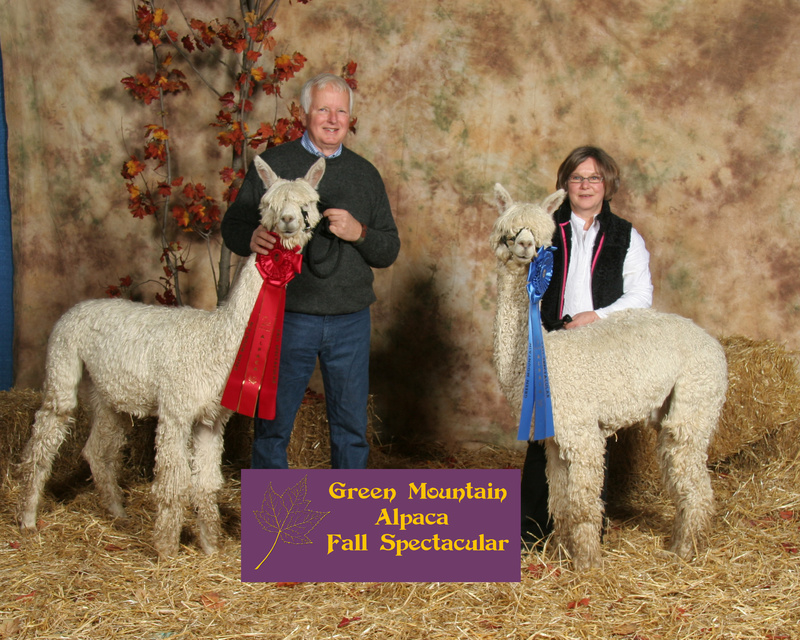A North Yarmouth couple is at the forefront of promoting small-scale farming in Maine and is doing so in an unconventional way, with alpacas. Ken and Claudia Raessler have about 35 critters from the camelid family (alpacas are related to camels) grazing at their 25-acre farm on North Road.
The long-necked creatures are becoming a serious sideline for the couple. Farming is not the Raessler’s sole occupation; Ken works as an anesthesiologist and Claudia is a lawyer. They’ve been farming for a just over a decade. So it may seem a little unusual that the couple was recently the only Maine recipient of a $30,000 Value-Added Producer Grant from the U.S. Department of Agriculture.
The Grant could have gone to a number of farm operators — from beekeepers to blueberry growers to alpaca farmers. Anything that’s produced on a farm that can then be further processed into an item with a higher price-point making it a “value-added product” was eligible. For the Raesslers at SuriPaco Alpaca, that value-added component is alpaca fiber.
Soft as cashmere and warmer, lighter and stronger than wool, alpaca fleece reportedly comes in more colors than any other fiber-producing animal. Alpacas were first imported to the United States in the 1980s. Native to South America, the animals were heavily relied on by the Incas in the Andes Mountains. Smaller than llamas, a typical animal weighs between 100 and 200 pounds and stands about 3 feet high at the shoulder.
For the past decade or so, the Raesslers have been increasingly serving as a hub for small-scale livestock farmers with fiber to sell.
“Eight or nine years ago most farmers were shearing their animals simply out of necessity and either storing the fleece in a barn or throwing it away,” Ken Raessler said. “Now there’s more effort to use that fiber.”
His wife Claudia notes “textiles are great story for Maine. We have a lot of textile resources in this state, and because of the woolen industry, we have a lot of people with expertise.”
The couple have grown children and jumped into farming after becoming empty-nesters. Once acquiring a great piece of property and having a house built, they wanted to do something that would utilize their 25 acres of pasture land.
“We needed an animal we could manage with our work schedules,” Claudia explained. “Alpacas are an animal that lent themselves very well to that; they’re relatively low maintenance.”
The animals proved positive and the Raesslers have since become proficient breeders as well as fiber producers. They enter their animals in alpaca shows across the country; Claudia is now a board member of the national Alpaca Owners and Breeders Association.
In time they began selling accessories such as socks, hats and gloves and have a store in Portland called the Alpaca Shed. In the process they started networking with various spinning mills in Maine including one in Fairfield and another in Springvale. They soon found themselves pooling their small amounts of fiber with other fiberproducers, which grew to using mills in Pennsylvania (Woolrich), Minnesota and Wyoming.
The grant will help about 25 fiber farms in Maine work collaboratively.
“The first part will be to do a feasibility study,” Claudia said, “to find out which products would be successful in the marketplace. The second part will be putting together a legal structure that these farms can work together in to make a product. The third part will be getting expertise to put together a Maine brand and put product into the market.”
The Raesslers say there are about 200,000 alpacas currently in the U.S. with demand for fiber steadily growing. To find out more visit suripaco.com.
Don Perkins is a freelance writer who lives in Raymond. He can be reached at:
presswriter@gmail.com
Send questions/comments to the editors.



Success. Please wait for the page to reload. If the page does not reload within 5 seconds, please refresh the page.
Enter your email and password to access comments.
Hi, to comment on stories you must . This profile is in addition to your subscription and website login.
Already have a commenting profile? .
Invalid username/password.
Please check your email to confirm and complete your registration.
Only subscribers are eligible to post comments. Please subscribe or login first for digital access. Here’s why.
Use the form below to reset your password. When you've submitted your account email, we will send an email with a reset code.